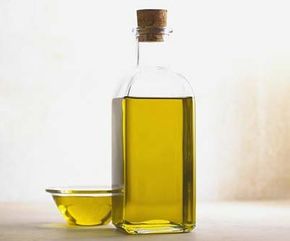How to Store Olive Oil
Because of olive oil's high monounsaturated fat content, it can be stored longer than most other oils -- as long as it's stored properly. Oils are fragile and need to be treated gently to preserve their healthful properties and to keep them from becoming a health hazard full of free radicals.
When choosing your storage location, remember that heat, air, and light are the enemies of oil. These elements help create free radicals, which eventually lead to excessive oxidation and rancidity in the oil that will leave a bad taste in your mouth. Even worse, oxidation and free radicals contribute to heart disease and cancer.
Advertisement
Rancidity can set in long before you can taste it or smell it. Rotten oils harm cells and use up precious antioxidants. Even though rancid oil doesn't pose a food-safety type of health risk, the less you consume, the better.
The best storage containers for olive oil are made of either tinted glass (to keep out light) or a nonreactive metal, such as stainless steel. Avoid metal containers made of iron or copper because the chemical reactions between the olive oil and those metals create toxic compounds. Avoid most plastic, too; oil can absorb noxious substances such as polyvinyl chlorides (PVCs) out of the plastic. Containers also need a tight cap or lid to keep out unwanted air.
Keep It Cool
Temperature is also important in preventing degradation of olive oil. Experts recommend storing the oil at 57 degrees Fahrenheit, the temperature of a wine cellar. Aren't lucky enough to have a wine cellar? A room temperature of about 70 degrees Fahrenheit will be fine. If your kitchen is routinely warmer than that, you can refrigerate the oil.
In fact, refrigeration is best for long-term storage of all olive oils except premium extra-virgin ones. Consider keeping small amounts of olive oil in a sealed container at room temperature -- perhaps in a small, capped porcelain jug that keeps out air and light. This way, your olive oil is instantly ready to use. Keep the rest in the refrigerator, but remember that refrigerated olive oil will solidify and turn cloudy, making it difficult to use. Returning it to room temperature restores its fluidity and color.
Another option is to store olive oil in a wide-mouth glass jar in the refrigerator. Even though it solidifies, you can easily spoon out any amount you need. A clear jar is fine because it's dark inside the refrigerator most of the time.
If you don't want to refrigerate your olive oil, keep it in a dark, cool cupboard away from the stove or other heat-producing appliances. Olive oil connoisseurs recommend storing premium extra-virgin olive oils at room temperature. If refrigerated, condensation could develop and adversely affect their flavor. Refrigeration does not affect the quality or flavor of other olive oils.
Olive oil will keep well if stored in a sealed container in a cool, dark cupboard for about one year. If unopened, the oil may keep for as long as two years.
Older Isn't Better
Unlike wine, oil does not improve with age. As olive oil gets older, it gradually breaks down, more free oleic acid is formed, the acidity level rises, and flavor weakens. Extra-virgin oils keep better because they have a low acidity level to start with, but you should use lower-quality oils within months because they start out with higher acidity levels. As oil sits on your shelf, its acidity level rises daily, and soon it is not palatable.
You'll get the best quality and flavor from your olive oil if you use it within a year of pressing. Olive oil remains at its peak for about two or three months after pressing, but unfortunately, few labels carry bottling dates or "use by" dates, let alone pressing dates.
More is at issue than flavor, however. Research shows the nutrients in olive oil degrade over time.
In a study that appeared in the May 2004 issue of the Journal of Agriculture and Food Chemistry, Spanish researchers tested virgin olive oil that had been stored for 12 months under perfect conditions.
What they found was quite surprising: After 12 months, many of the oil's prime healing substances had practically vanished. All the vitamin E was gone, as much as 30 percent of the chlorophyll had deteriorated, and 40 percent of the beta-carotene had disintegrated. Phenol levels had dropped dramatically, too.
Instead of stashing your olive oil in the cabinet, why not unleash its flavor on your favorite foods? The next page has tons of tips for how to use olive oil.
To learn more about the topics covered in this article, check out the following links:
- To learn about how olive oil can improve your health, read The Health Benefits of Olive Oil.
- If you wanted to know how to grow and use garlic, try How to Plant and Store Garlic.
- Natural Weight-Loss Food: Olive Oil, can tell you more about how olive oil can help you lose weight.
